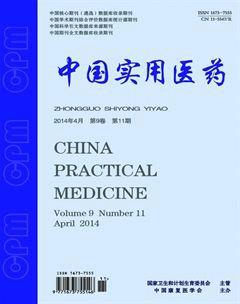血清C反應(yīng)蛋白測定在晚期胃癌患者中的臨床意義分析
王彩玲+王俊生
【摘要】 目的 研究血清C反應(yīng)蛋白測定在晚期胃癌患者中的臨床意義。方法 對102例經(jīng)過病理確診的晚期胃癌患者的血清CRP水平進(jìn)行檢測, 同時檢測癌胚抗原, 糖類抗原并對治療前后的。結(jié)果 CRP在胃癌中數(shù)值明顯升高, 經(jīng)過治療后, 患者的CRP水平均較治療前有明顯的下降, 差異有統(tǒng)計學(xué)意義聯(lián)合檢測陽性率較單獨腫瘤標(biāo)志物檢測陽性率明顯升高。結(jié)論 CRP對胃癌診斷及預(yù)后判斷有臨床價值, 與CEA、CA19-9結(jié)合起來可以作為胃癌診斷治療的標(biāo)記物。
【關(guān)鍵詞】 晚期胃癌;C反應(yīng)蛋白(CRP);標(biāo)記物
【Abstract】 Objective To study the clinical significance of serum C-reactive protein(CRP)levels in patients with advanced gastric cancer. Methods Levels of serum CRP were detected in 102 cases of advanced gastric cancer,in the same time CA19-9, CEA were detected.and check the level after chemotherapy. Results Serum CRP levels in patients with advanced gastric cancer were significantly higher,after chemotherapy it has a evidently drop(P<0.05). The positive rate of advanced gastric cancer diagnosis are higher in CA19-9, CEA and CRP combination than the isolated analysis.Conclusion CRP may be helpful to make its diagnosis and assess the prognosis in the patients with advanced gastric cancer.It can be a marker as diagnosis of gastric cancer combined with CA19-9 and CEA .
【Key words】 Advanced gastric cancer; Creactive protein; Markers
胃癌是常見的消化系統(tǒng)惡性腫瘤, 在我國的發(fā)病率和死亡率居各種惡性腫瘤的前列, 嚴(yán)重威脅人類的健康。且多數(shù)患者一有主訴癥狀已屬于晚期, 進(jìn)展期胃癌已失去手術(shù)切除治愈機(jī)會, 全身化療成為綜合治療的主要手段, 但通常預(yù)后較差。對于腫瘤復(fù)發(fā)和轉(zhuǎn)移的預(yù)測并采取恰當(dāng)?shù)念A(yù)防措施是亟待解決的一個重要課題。腫瘤標(biāo)志物的檢測目前已廣泛應(yīng)用于臨床, 本院除檢測CEA、CA19-9 和CA72-4等已經(jīng)研究相對成熟的腫瘤標(biāo)志物外, 新開展了CRP等標(biāo)志物的檢測, 以研究其在胃癌診斷及治療中的臨床應(yīng)用價值, 及其對進(jìn)展期胃癌復(fù)發(fā)和轉(zhuǎn)移的預(yù)測。本實驗就試行揭示CRP在進(jìn)展期胃癌的治療中是否得到較好的表達(dá), 指導(dǎo)臨床應(yīng)用。
3 討論
CRP為急性時相反應(yīng)蛋白, 正常情況下體內(nèi)含量極微,而在急性創(chuàng)傷、感染、心血管炎癥及腫瘤疾病患者的外周血中濃度急劇升高[1], 后來發(fā)現(xiàn)在多數(shù)腫瘤患者的血清中CRP的表達(dá)量升高。究其原因可能是繼發(fā)于腫瘤壞死、局部組織損傷及炎癥的一個反應(yīng)[2]。在腫瘤微環(huán)境中炎癥細(xì)胞產(chǎn)生的細(xì)胞因子尤其是IL-6 隨血液循環(huán)到達(dá)肝臟誘導(dǎo)肝細(xì)胞合成 CRP及其他急性時相反應(yīng)蛋白[3, 4]。
血清CRP的檢測對腫瘤評估具有重要的臨床價值, Miyake等[5]研究發(fā)現(xiàn)高敏CRP的血清濃度可以作為胃、腸道、肝、膽及胰腺腫瘤的一個較可靠的診斷指標(biāo)。對于惡性腫瘤而言, 高水平的CRP 濃度或進(jìn)行性升高往往預(yù)示著腫瘤的轉(zhuǎn)移擴(kuò)散, 當(dāng)病情得到緩解時血清CRP濃度又迅速恢復(fù)至正常水平[6], 因此認(rèn)為CRP 可以作為判斷惡性腫瘤預(yù)后的參考指標(biāo)[ 7]。本實驗也證實, 在進(jìn)展期胃癌, 化療前CRP陽性率較高, 化療后CRP數(shù)值下降明顯, 提示可以作為胃癌的療效觀察指標(biāo)。
CEA與CA19-9均為胃癌相關(guān)性抗原, 作為粘附分子, 二者均可與細(xì)胞表面的整合素家族互為配/受體, 介導(dǎo)鈣離子非依賴性的細(xì)胞間黏附作用, 從而破壞上皮組織的結(jié)構(gòu)完整性, 有利于腫瘤細(xì)胞從原發(fā)灶脫落并黏附到鄰近組織, 與腫瘤侵襲過程密切相關(guān)[8]。臨床研究亦證實,陽性的胃癌患者在臨床上多處于進(jìn)展期[9], 且此類患者多預(yù)后不良[10]。研究顯示CA19-9陽性除與淋巴結(jié)轉(zhuǎn)移相關(guān)外, 還是胃癌肝轉(zhuǎn)移的危險因素, CA19-9陽性患者與陰性患者之間生存期有明顯差異]發(fā)現(xiàn)CA19-9或CEA升高者發(fā)生淋巴結(jié)轉(zhuǎn)移的可能性明顯增高, 因此CA19-9和CEA升高者被劃分入III期或Ⅳ期腫瘤。有研究報道血清CA19-9和CEA濃度升高的比例約為30%~38.9%[12], 二者聯(lián)合檢測可顯著提高消化系統(tǒng)惡性腫瘤的檢出率。聯(lián)合檢測較單項檢測比, 可至少提高陽性率14.7% [12]。二者的聯(lián)合檢測目前已廣泛用于胃癌相關(guān)臨床指征的監(jiān)測。本實驗CA19-9及CEA聯(lián)合檢測(兩聯(lián))陽性率為62.3%, 高于資料顯示考慮與患者均為IV期胃癌有關(guān), CA19-9及CEA聯(lián)合CRP檢測(三聯(lián))陽性率為71.7%, 高于CA19-9及CEA兩聯(lián)檢測結(jié)果, 可提高胃癌檢出率。
綜上所述, CRP對于胃癌患者的動態(tài)觀察及治療效果評定具有十分重要的意義。把CRP和CA19-9、CEA聯(lián)合起來分析, 更能提高胃癌的診療水平。而且, 該檢查創(chuàng)傷性小, 費用低, 易于被患者接受, 可以在臨床廣泛運用。endprint
參考資料
[1] Dhingra R, Gona P, Nam BH, et al. C-reactive protein, inflammatory conditions, and cardiovascular disease risk. Am J Med, 2007, 120(12):1054-1062.
[2] Mantovani A, Garlanda C, Doni A, et al. Pentraxins in innate immunity : from C-reactive protein to the long pentraxin PTX3.J Clin Immunol, 2008,28(1):1-13.
[3] McMillan DC, McArdle CS, Morrison DS. A clinical risk score to predict 3-,5-,and 10- year survival in patients undergoing surgery for Dukes B colorectal cancer.Br J Cancer, 2010,103(7):970-974.
[4] Bromwich EJ, McArdle PA, Canna K, et al. The relationship between T-lymphocyte infiltration, stage tumour grade and survival in patients undergoing curative surgery for renal cell cancer.Br J cancer, 2003,89(10):1906-1908.
[5] Miyake K, Imura S, Nishioka M, et al. Serum evaluation of soluble interferon-alpha/beta receptor and high-sensitivity C-reactive protein for diagnosis of the patients with gastrointestinal and hepatobiliary-pancreatic cancer.Cytokine, 2010,49(3):251-255.
[6] Nozoe T, Korenaga D, Futugi M, et al. Immunohistochem expression of C-reactive protein in squamous cell carcinoma of the esophagus-significance as a tumor markers.Cancer Lett, 2003,192(1):89-95.
[7] Nakanishi H, Araki N, Kudawara I, et al. Clinical implications of serum C-reactive protein levels in malignant fibrous histiocytoma.Int J Cancer, 2002,99(2):167-179.
[8] 張學(xué)庸.胃癌的基礎(chǔ)研究與臨床.北京:科學(xué)出版社,1999:61.
[9] 王世和.胃癌病人術(shù)前血清CEA與CAl9-9水平的預(yù)后價值.國外醫(yī)學(xué)腫瘤分冊, 1996,10(23):314.
[10] Mitsugu K, Masashi F, Noriaki K, et a1. Evaluation of serum CEA and CAl9-9 levels as prognostic factors in patients with gastric cancer.Gastric Cancer, 2000,3(4):177-186.
[11] Nakanishi H, Kodera Yamamura Y, et al. Rapid quantitative detection of carcino embryonie antigen-expressing free tumor cells in the peritoneal cavity of gastric cancer patients with realtime RT-PCR on the lightcycler. Int J Caneer, 2000,89(5):411-417.
[12] 趙萬斌,黃江渝,李建紅,等.聯(lián)合檢測消化系統(tǒng)惡性腫瘤患者血清中CAl9-9.CEA的臨床意義.四川醫(yī)學(xué), 2001,22(6):574.endprint
參考資料
[1] Dhingra R, Gona P, Nam BH, et al. C-reactive protein, inflammatory conditions, and cardiovascular disease risk. Am J Med, 2007, 120(12):1054-1062.
[2] Mantovani A, Garlanda C, Doni A, et al. Pentraxins in innate immunity : from C-reactive protein to the long pentraxin PTX3.J Clin Immunol, 2008,28(1):1-13.
[3] McMillan DC, McArdle CS, Morrison DS. A clinical risk score to predict 3-,5-,and 10- year survival in patients undergoing surgery for Dukes B colorectal cancer.Br J Cancer, 2010,103(7):970-974.
[4] Bromwich EJ, McArdle PA, Canna K, et al. The relationship between T-lymphocyte infiltration, stage tumour grade and survival in patients undergoing curative surgery for renal cell cancer.Br J cancer, 2003,89(10):1906-1908.
[5] Miyake K, Imura S, Nishioka M, et al. Serum evaluation of soluble interferon-alpha/beta receptor and high-sensitivity C-reactive protein for diagnosis of the patients with gastrointestinal and hepatobiliary-pancreatic cancer.Cytokine, 2010,49(3):251-255.
[6] Nozoe T, Korenaga D, Futugi M, et al. Immunohistochem expression of C-reactive protein in squamous cell carcinoma of the esophagus-significance as a tumor markers.Cancer Lett, 2003,192(1):89-95.
[7] Nakanishi H, Araki N, Kudawara I, et al. Clinical implications of serum C-reactive protein levels in malignant fibrous histiocytoma.Int J Cancer, 2002,99(2):167-179.
[8] 張學(xué)庸.胃癌的基礎(chǔ)研究與臨床.北京:科學(xué)出版社,1999:61.
[9] 王世和.胃癌病人術(shù)前血清CEA與CAl9-9水平的預(yù)后價值.國外醫(yī)學(xué)腫瘤分冊, 1996,10(23):314.
[10] Mitsugu K, Masashi F, Noriaki K, et a1. Evaluation of serum CEA and CAl9-9 levels as prognostic factors in patients with gastric cancer.Gastric Cancer, 2000,3(4):177-186.
[11] Nakanishi H, Kodera Yamamura Y, et al. Rapid quantitative detection of carcino embryonie antigen-expressing free tumor cells in the peritoneal cavity of gastric cancer patients with realtime RT-PCR on the lightcycler. Int J Caneer, 2000,89(5):411-417.
[12] 趙萬斌,黃江渝,李建紅,等.聯(lián)合檢測消化系統(tǒng)惡性腫瘤患者血清中CAl9-9.CEA的臨床意義.四川醫(yī)學(xué), 2001,22(6):574.endprint
參考資料
[1] Dhingra R, Gona P, Nam BH, et al. C-reactive protein, inflammatory conditions, and cardiovascular disease risk. Am J Med, 2007, 120(12):1054-1062.
[2] Mantovani A, Garlanda C, Doni A, et al. Pentraxins in innate immunity : from C-reactive protein to the long pentraxin PTX3.J Clin Immunol, 2008,28(1):1-13.
[3] McMillan DC, McArdle CS, Morrison DS. A clinical risk score to predict 3-,5-,and 10- year survival in patients undergoing surgery for Dukes B colorectal cancer.Br J Cancer, 2010,103(7):970-974.
[4] Bromwich EJ, McArdle PA, Canna K, et al. The relationship between T-lymphocyte infiltration, stage tumour grade and survival in patients undergoing curative surgery for renal cell cancer.Br J cancer, 2003,89(10):1906-1908.
[5] Miyake K, Imura S, Nishioka M, et al. Serum evaluation of soluble interferon-alpha/beta receptor and high-sensitivity C-reactive protein for diagnosis of the patients with gastrointestinal and hepatobiliary-pancreatic cancer.Cytokine, 2010,49(3):251-255.
[6] Nozoe T, Korenaga D, Futugi M, et al. Immunohistochem expression of C-reactive protein in squamous cell carcinoma of the esophagus-significance as a tumor markers.Cancer Lett, 2003,192(1):89-95.
[7] Nakanishi H, Araki N, Kudawara I, et al. Clinical implications of serum C-reactive protein levels in malignant fibrous histiocytoma.Int J Cancer, 2002,99(2):167-179.
[8] 張學(xué)庸.胃癌的基礎(chǔ)研究與臨床.北京:科學(xué)出版社,1999:61.
[9] 王世和.胃癌病人術(shù)前血清CEA與CAl9-9水平的預(yù)后價值.國外醫(yī)學(xué)腫瘤分冊, 1996,10(23):314.
[10] Mitsugu K, Masashi F, Noriaki K, et a1. Evaluation of serum CEA and CAl9-9 levels as prognostic factors in patients with gastric cancer.Gastric Cancer, 2000,3(4):177-186.
[11] Nakanishi H, Kodera Yamamura Y, et al. Rapid quantitative detection of carcino embryonie antigen-expressing free tumor cells in the peritoneal cavity of gastric cancer patients with realtime RT-PCR on the lightcycler. Int J Caneer, 2000,89(5):411-417.
[12] 趙萬斌,黃江渝,李建紅,等.聯(lián)合檢測消化系統(tǒng)惡性腫瘤患者血清中CAl9-9.CEA的臨床意義.四川醫(yī)學(xué), 2001,22(6):574.endprint

